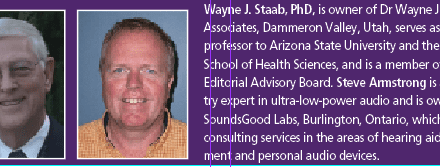Staff Standpoint | January 2017 Hearing Review

The Dissemination Meeting was designed to facilitate discussion on strategies for improving hearing healthcare access and affordability, and to identify needs, barriers, and opportunities for action. But, in reality, it was a brainstorming session for how (or if) stakeholders could collaborate, particularly for those recommendations that have acquired general consensus. In the morning general session, Committee panelists made short presentations on the 12 recommendations then invited comments from the attendees. In the afternoon, the participants and sponsors broke into three breakout sessions to discuss: 1) Public Education and Awareness; 2) Quality Metrics and Health Professional Education; and 3) Innovation in Services—Access and Affordability.
Some controversies wisely averted. The Dissemination Meeting essentially dispatched the “physician waiver” controversy with Dr Mann’s announcement, and then relegated the OTC and other deregulation debates to the “Innovations to Services” breakout session. Dr Mann said that the FDA will consider a regulatory framework for OTC hearing aids without the requirement for consultation with a credentialed dispenser. Reactions to this are mixed. A good number of the people I’ve spoken with think the devil is in the details, particularly in labeling. They also become uneasy about the blanket term “mild-to-moderate” given that the general definition of “moderate hearing loss” extends to 70 dB HL—a deficit unlikely to avail itself to a do-it-yourself approach.
Importantly, QualComm, Samsung, and other huge electronics and telecommunications firms are lobbying for the FDA to get completely out of hearing device regulation. This would constitute a “nuclear option” for the Agency—waiving quality controls (QSRs) and destroying professional hearing care as we know it. Given the Committee’s own findings about hearing loss and its impact on health, I would hope this is an unlikely option.
Focus on the “other” recommendations. In my June and July editorials, I wrote about how the FDA is in a pickle. But it’s apparent the Agency is now using the NAS recommendations as a game plan out of its thorniest problems. We will see a proposed OTC device category. We should see proposed rules for enhancing patients’ portability of records (eg, audiograms) and prohibitions against “locking out” clinicians from programming software and records. We might even see a list of “best practices,” ranging from real-ear and outcomes measures to unbundled pricing.
We can help shape some of these regulations. However, we should also recognize that right now we have the spotlight. We stand on the threshold of a tremendous opportunity to change our field for the better with collaborative promotion of hearing healthcare, garnering important research funding, and partnering with numerous entities (as recommended by NAS) that can seat hearing care at the table of “generally accepted healthcare practices.”
The key obstacle is ourselves. We need to suspend the business-as-usual and counterproductive talk about “gatekeeper status,” and stand together in educating people about the value proposition of “professional hearing care” and “qualified hearing care professionals” (not “ENTs,” “audiologists,” or “hearing aid specialists”). Because, if we don’t, no one will—especially not the electronics and telecom giants—and we could be crushed, with no one to blame but ourselves.




